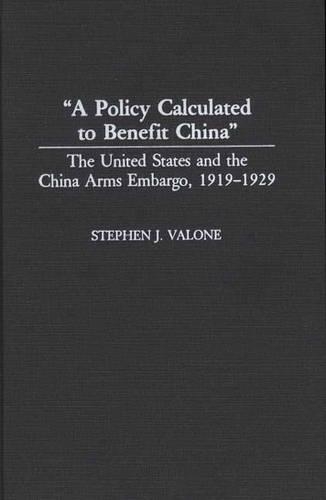
A Policy Calculated to Benefit China: The United States and the China Arms Embargo, 1919-1929
(Hardback)
Publishing Details
A Policy Calculated to Benefit China: The United States and the China Arms Embargo, 1919-1929
By (Author) Stephen Valone
Bloomsbury Publishing PLC
Praeger Publishers Inc
30th April 1991
United States
Classifications
Tertiary Education
Non Fiction
Arms trade
327.73051
Physical Properties
Hardback
176
Description
Stephen Valone takes the first in-depth look at China arms embargo (1919-1929) and places it in the larger context of United States foreign policy. Until now historians have focused on the formation of the Second Banking Consortium as the US' primary weapon against Japan's aspirations in China. Valone explores the crucial role that the China arms embargo concurrently played in limiting Japan's intentions. The embargo's ostensible goal was to inhibit the flow of weapons into China forcing rival Chinese factions to negotiate their differences at the conference table. The United States' deeper motive was to roll back Japan's influence and defend its Open Door policy in China. Valone's diplomatic history concludes with a positive assessment of the embargo as a tool of US foreign policy.
Reviews
The events of WW I and the diplomatic decisions to omit a statement of racial equality from the Covenant of the League of Nations as well as to allow Japan to retain the Shantung Peninsula exacerbated the volatile political situation in China. Subsequently, the victors tried to stabilize conditions and to solidify the Beijing government's power by imposing an arms embargo on the country. Though well intentioned, the embargo did little to improve the situation; the Soviet Union was the only nation to benefit from it. When Sun Yat-sen failed to secure arms from the West, he turned to the Russians for assistance. The resulting Sun-Joffe Agreement was a major factor in Sun's eventual victory in the political struggle. By 1929, the US recognized Sun's successor, Chiang K'ai-shek, as the legitimate ruler of China and ended the embargo. Valone presents the events of 1919 to 1929 in a logical, readable manner....his study is a worthwhile addition to undergraduate libraries.-Choice
"The events of WW I and the diplomatic decisions to omit a statement of racial equality from the Covenant of the League of Nations as well as to allow Japan to retain the Shantung Peninsula exacerbated the volatile political situation in China. Subsequently, the victors tried to stabilize conditions and to solidify the Beijing government's power by imposing an arms embargo on the country. Though well intentioned, the embargo did little to improve the situation; the Soviet Union was the only nation to benefit from it. When Sun Yat-sen failed to secure arms from the West, he turned to the Russians for assistance. The resulting Sun-Joffe Agreement was a major factor in Sun's eventual victory in the political struggle. By 1929, the US recognized Sun's successor, Chiang K'ai-shek, as the legitimate ruler of China and ended the embargo. Valone presents the events of 1919 to 1929 in a logical, readable manner....his study is a worthwhile addition to undergraduate libraries."-Choice
Author Bio
STEPHEN J. VALONE is Assistant Professor of History at St. John Fisher College in Rochester, New York. Specializing in United States diplomatic history, Dr. Valone has written several articles in his field of interest.
